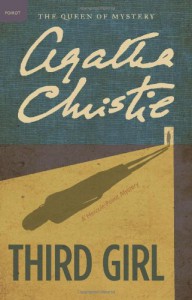The Peacock Struts

I actually did enjoy this one more the second time around, although I maintain that the puzzle aspect of the book is just not good. Before I get to that, though, I want to talk about what I liked.
Ariadne Oliver is very prominent in this book, as is Miss Lemon, which were the two things that I just loved about it. Miss Lemon isn't as prominent here as she is in Hickory Dickory Dock, but we get a fairly sustained appearance. And Mrs. Oliver is actually assaulted as part of this investigation as she is blood-hounding about after The Peacock.
This reread has solidified for me how much I love Christie's young(er) women. Every time I read one of her books, I find a side character that just fills me with delight. Hastings is actually one of my least favorite sidekicks, and Mrs. Oliver is absolutely my most favorite. Any book where Ariadne Oliver shows up - even if she's just mentioned - makes me smile. I even liked Norma Restarick, the putative victim, who grew on me throughout the course of this book.
I will say that the book IS better than the adaptation, which keeps the same murderer but not all of the murders. The best thing about the adaptation is Tom Mison as David Baker, aka The Peacock. He comes off much better in the adaptation than in the book, where he has no redeeming value.

This is also Poirot (and Agatha) at his most cerebral. Not quite so much as The Clocks, perhaps, but by this time in the series, Poirot is quite elderly (the timeline for Poirot is problematic, to put it as charitably as possible) since this book occurs during the swinging sixties. While he has slowed down physically, the little grey cells are still as clever as ever.
Which brings me to the primary weaknesses of the book - it just isn't plausible. The actual motive behind the murder is clever, and works well, but (and here I will venture into spoiler territory, so click the spoiler warning at your own risk)
(show spoiler)
Basically, if I don't read this one for the mystery, but read it for the interactions between the characters and the opportunity to spend time with a clever, elderly Hercule Poirot, I really enjoy it. The plot though, eh.






 5
5
 10
10
